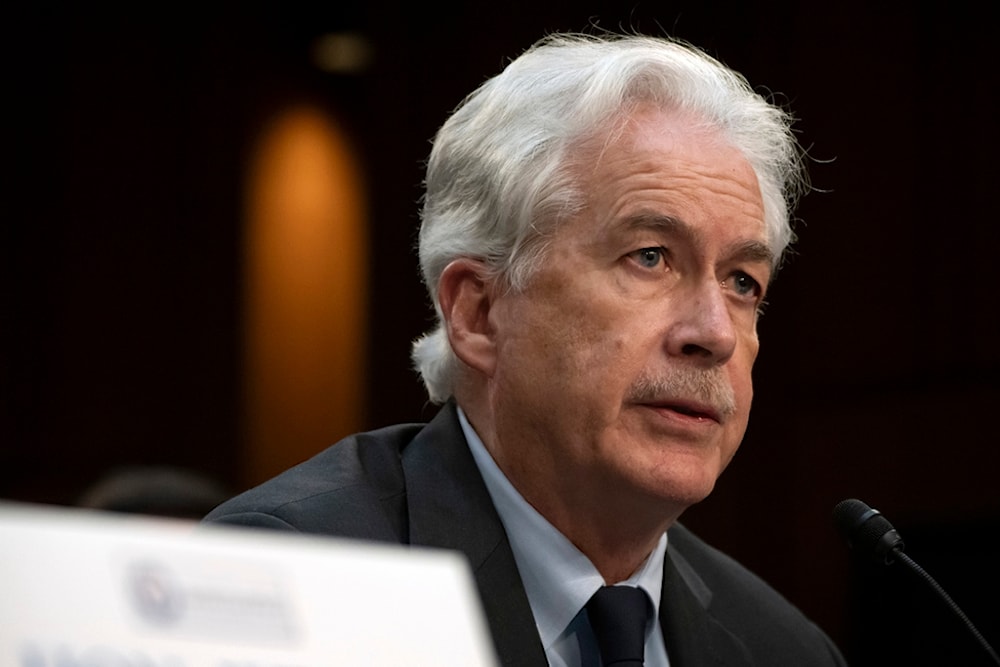US to make more detailed Gaza deal proposal in coming days: CIA chief
CIA chief William Burns and MI6 Chief Richard Moore say their agencies are working for a ceasefire in Gaza.
-

CIA director William Burns speaks during a hearing, on March 11, 2024, in Washington. (AP)
A more comprehensive proposal regarding a ceasefire between Hamas and "Israel" in the Gaza Strip would be made in the coming days, indicated CIA Director William Burns, who is leading US efforts to negotiate an agreement.
"We will make this more detailed proposal, I hope in the next several days, and then we'll see," Burns indicated at a Financial Times event in London on Saturday.
He said there is ongoing work on "texts and creative formulas" aimed at developing a proposal that would meet the needs and conditions of both sides.
A few days ago, Reuters reported that the White House is working to finalize a new proposal for a ceasefire and the release of Israeli captives held in Gaza.
US officials and sources in Egypt said the proposal aims to address key issues that have stalled the negotiations mediated by the US, Qatar, and Egypt.
According to US claims, much of the agreement is in place, however, negotiators maintain that they are yet to resolve two main obstacles.
The key issues still being negotiated are, on the one hand, "Israel's" demand to maintain a presence in the Philadelphi Corridor.
On the other hand, the second key problem has been determining which Palestinian detainees will be included in the proposed exchange of Israeli occupation captives for Palestinian detainees held in Israeli occupation prisons, according to an unnamed administration official.
"The feeling is that time is up. Don't be surprised if you see [the revised draft] this weekend," said one official who spoke to Reuters.
Another US official underscored that "there is a very strong perception on the part of the negotiators that the ceasefire is slipping away."
Read more: Exclusive - Resistance source: Philadelphi main obstacle to ceasefire
CIA, MI6 chief underline need to maintain Kiev support
In a related context, Burns and MI6 Chief Richard Moore said their agencies "have exploited our intelligence channels to push hard restraint and de-escalation" in West Asia and are working for a ceasefire in Gaza that could end the "appalling loss of life of Palestinian civilians" and see Hamas release captives held since October 7.
In a jointly penned op-ed for the Financial Times on Saturday, the heads of the US and Britain's spy services underlined the critical importance of maintaining support for Kiev, vowing to deepen their cooperation on Ukraine and other pressing global challenges.
The two chiefs highlighted the longstanding partnership between the US and UK intelligence services, which celebrated 75 years of collaboration two years ago.
"The partnership lies at the beating heart of the special relationship between our countries," read the article, which marks the first time the leaders of their agencies have co-authored an op-ed.
The CIA and MI6 "stand together in resisting an assertive Russia and (Russian President Vladimir) Putin's war of aggression against Ukraine," Burns and Moore said, affirming that "staying the course (in Ukraine) is more vital than ever."
Both leaders reiterated their agencies' commitment to providing intelligence support to Ukraine.
Moore described Ukraine's incursion into Russia's Kursk region as an "audacious and bold" maneuver aimed at altering the strategic landscape of the conflict.
Burns, while acknowledging the offensive as a "significant tactical achievement" for Ukraine, tempered expectations by stating there was no indication that Russian President Vladimir Putin's hold on power was diminishing as a result.
They also said the US and Britain's spy services would continue to thwart the Russian intelligence's "reckless campaign of sabotage across Europe" and what they described as its "cynical use of technology" to spread disinformation "to drive wedges between us."
Elsewhere, Burns and Moore highlighted that their agencies have undergone reorganization to address the rise of China, which they described as "the principal intelligence and geopolitical challenge of the 21st Century."

 4 Min Read
4 Min Read








